Exadata Storage Server - Key Technologies
Like any other storage device the Exadata Storage Servers (also referred to as an Exadata CELL) run an Operating System (OS), which in the case of Exadata is Oracle Enterprise Linux 5.5. The Exdadata Storage Server Software provided by Oracle resides under OEL.
CELLSRV (Cell Services), MS (Management Server) and RS (Restart Server) are the primary components of an unique multi-threaded softwareset providing the majority of Exadata storage services.
Key technologies provided by the Cell Services to match the needs of high performance database processing are:
Exadata Software Features
- Exadata Smart Scans
- 10X or greater reduction in data sent to database servers
- Exadata Storage Indexes
- Eliminate unnecessary I/Os to disk
- Hybrid Columnar Compression (HCC)
- Efficient compression increases effective storage capacity and increases user data scan bandwidths by a factor of 10X
- Exadata Smart Flash Cache
- Breaks random I/O bottleneck by increasing IOPs by 20X
- Doubles user data scan bandwidths
- I/O Resource Manager (IORM)
- Enables storage grid by prioritizing I/Os to ensure predictable performance
- Inter-leaved Grid Disks
- Enables storage grid that allows multiple applications to place frequently accessed data on faster portions of the disk

Exadata Smart Scan
- Exadata cells implement scan offload to greatly reduce the data sent to database servers
- Row filtering based on “where” predicate
- Column filtering
- Join filtering
- Incremental backup filtering
- Scans on encrypted data
- Data Mining model scoring
- 10x data reduction is common
- Completely application transparent
- Even if cell or disk fails during a query
Exadata Storage Index
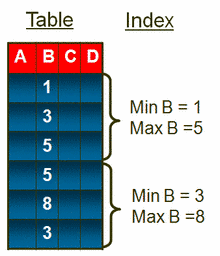
Transparent I/O Elimination with No Overhead
- Exadata Storage Indexes maintain summary information about table data in memory
- Store MIN and MAX values of columns
- Typically one index entry for every MB of disk
- Eliminates disk I/Os if MIN and MAX can never match “where” clause of a query
- Completely automatic and transparent
Exadata Intelligent Storage Grid
Most Scalable Data Processing
- Data Intensive processing runs in Exadata Storage Grid
- Filter rows and columns as data streams from disks (112 Intel Cores)
- Scale-out storage removes bottlenecks
- Example: How much product X sold in month Y

Exadata Hybrid Columnar Compression
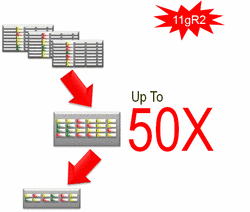
- Data is stored by columnand then compressed
- Query Mode for data warehousing
- Optimized for speed
- 10X compression ratio is typical
- Scans improve proportionally
- Archival Mode for infrequently accessed data
- Optimized to reduce space
- 15X compression is typical
- Up to 50X for some data
Warehousing and Archiving
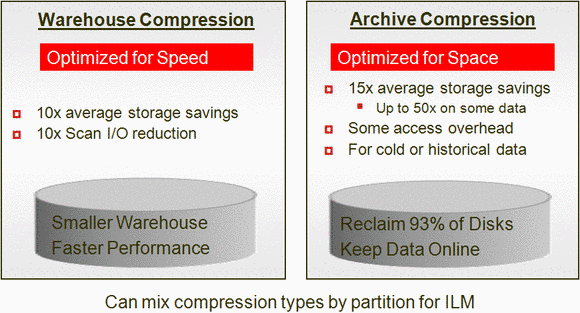
Real-World Compression Ratios
Oracle Production E-Business Suite Tables
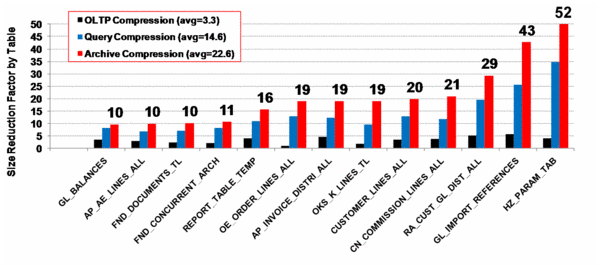
- Columnar compression ratios
- Query = 14.6X
- Archive = 22.6X
- Vary by application and table

Exadata Smart Flash Cache
- Caches Hot Data Transparently in the 4 Flash Cards
- Use PCI Express based Flash Cards for greater throughput and IOPs and avoid disk controller limitations
- Smart Caching
- Smarter than basic LRU algorithm
- Knows when to skip caching objects to avoid polluting or flushing the cache
- Allows applications to explicitly optimize caching
Exadata I/O Resource Management
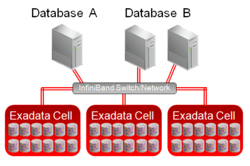
Multi-Database Environment
- Ensure different databases are allocated the correct relative amount of I/O bandwidth
- Database A: 33% I/O resources
- Database B: 67% I/O resources
- Ensure different users and tasks within a database are allocated the correct relative amount of I/O bandwidth
- Database A:
- Reporting: 60% of I/O resources
- ETL: 40% of I/O resources
- Database B:
- ad Hoc: 30% of I/O resources
- Batch: 70% of I/O resources
- Database A:

Interleaved Grid Disks
- Grid disks are optionally split and interleaved to place frequently accessed data in all grid disks on higher performing outer tracks
- All applications benefit from higher performance outer tracks of disks
Unser Portfolio:
- Consulting
- Software Development
- Database
- Managed Services
- Exastack
- ISE Oracle Technology Center
- Helpdesk
- Data Integration
- Migration
- High Availability
- Tuning
- IT Services
- Business Intelligence
- Support
- Oracle Licenses
